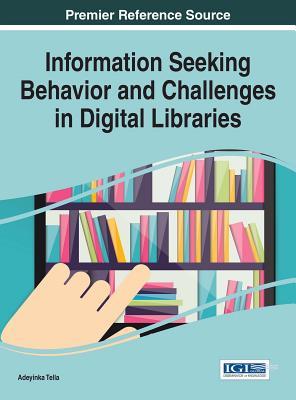Read Online Information Seeking Behavior and Challenges in Digital Libraries - Adeyinka Tella file in ePub
Related searches:
Information-Seeking Behavior of Undergraduate, Graduate, and
Information Seeking Behavior and Challenges in Digital Libraries
Information-Seeking Behavior and Reference Medium Preferences
Information needs and information-seeking behaviour analysis
Different Information-Seeking Tasks: Behavior Patterns and
Youth Information Seeking Behavior: Theories, Models, and Issues
Information Seeking Behavior and Viewpoints of Emergency - NJIT
Information Seeking Behavior and Technology Adoption:
Information behavior and seeking (Chapter 2) - Interactive
Amazon.com: Information Seeking Behavior and Technology
ERIC - EJ298483 - Information-Seeking Behavior: Patterns and
In some studies both discipline and work affected information-seeking behavior a lot, since both comprised basic roles of the individual in social life. However, a number of studies showed that discipline is not the most important factor that affects information-seeking behavior.
The field of information seeking behaviour in information science can broadly be defined as that which is concerned with determining user's information.
An up-to-date overview of research conducted during the past decade related to youth information-seeking behavior in a digital environment reveals challenges.
Information seeking: a model may be described as a framework for thinking about a problem and may evolve into a statement of the relationships among theoretical propositions.
Specifically, the study tries to develop a deeper understanding of the changing nature of participants' general research processes and their information-seeking.
Information seeking behavior and challenges in digital libraries addresses the problems of usability and search optimization in digital libraries.
The aim of this review is to discuss the information needs and information seeking behavior of legislators from different government parliaments.
Figure 1: wilson’s information seeking behaviour model wilson’s 1996 model is a major revision of that of 1981, drawing upon research from a variety of fields other than information science, including decision making, psychology, innovation, health communication, and consumer research.
The information seeking process is a progression from uncertainty to understanding accompanied by a range of feelings and actions on the part of the information.
Wilson's models grounded in multi-disciplinary re- search serve as milestones shaping the information.
Information seeking is the process of searching and finding information, and of producing new knowledge. Factors that influence information-seeking behavior may include the discipline, the demands of faculty members, the curriculum, and personal characteristics.
Between teens‟ information-seeking behavior and that of their parents‟ generation. Despite the unique characteristics that surround teens‟ information use, there has been surprisingly limited research analyzing their information-seeking behavior. Shenton (2007) explained that this demographic can be difficult to study for a number of reasons.
Definition of information seeking behavior: a special case of problem solving which, includes recognizing and interpreting the information problem, establishing.
Information seeking behaviour arises as a consequence of a need perceived by the information user, who in order to satisfy it, makes demands upon formal or informal information sources or services, resulting in either success or failure (wilson 1999:251).
Oct 8, 2020 using the risk information seeking and processing (risp) model, this research applied a structural equation model and survey with a structured.
With the rapid development of information and communication technology, seeking information over the internet has been time efficient and easily available.
Changing information seeking behaviour in digital erainformation communication technology (ict) is one of the important words of today's world. It has changed the society into information society and our way of life.
Project information literacy: what can be learned about the information-seeking behavior of today's college students? chicago:.
Different information-seeking tasks: behavior patterns and user expectations summary: simple fact-finding tasks were less memorable, with basic user expectations like plain language. Complex research tasks required more effort; users asked for advanced features including comparison tables and chunked content for these tasks.
Seeking information about one's health is increasingly documented as a key coping strategy in health-promotive activities and psychosocial adjustment to illness.
Sources [8-9]� there are only a few studies of historians' information- seeking behavior that have focused on their use of archives and archival research tools.
Definitions of information-seeking behavior, information needs, information gathering, information giving, and source preference are discussed.
This study aims at investigating information-seeking behavior of nursing students in greece and, thereafter, the factors that influence the use of electronic journals.
2 - information behavior and seeking edited by ian ruthven, diane kelly publisher: facet pp 15-42.
Information-seeking behavior information seeking behavior is “the purposive seeking for information as a sequence of a need to satisfy some goal” (wilson, 2000), which could be triggered and impacted by the risk level, task complexity, and time pressure (gu and mendonça, 2008).
Keywords: human information behavior, information seeking, research, user studies. Until recently the computer science and information systems�.
Objective: to analyse studies that assessed the information needs and information-seeking behaviour of physicians and nurses in a primary care setting to develop a better understanding of what information to present to physicians when they making clinical decisions.

Post Your Comments: